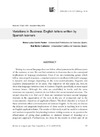Identificador persistente para citar o vincular este elemento:
https://accedacris.ulpgc.es/jspui/handle/10553/7059
| Título: | Variations in Business English letters written by non-native writers | Autores/as: | Carrió Pastor, María Luisa Muñiz Calderón, Rut |
Clasificación UNESCO: | 570107 Lengua y literatura 550510 Filología |
Fecha de publicación: | 2010 | Publicación seriada: | LFE. Revista de Lenguas para Fines Específicos | Resumen: | Writing in a second language does not follow a fixed pattern in the different parts of the sentence or text. We can find variations in discourse due to the conceptual implications of language production. Even if we are considering genres which follow stereotyped structures, a standard pattern is not always followed. Language is dynamic and changes depending on the socio-communicative, linguistic and cognitive characteristics of its users. The objectives of this paper are, first, to show that language variation exists in business English, specifically, in stereotyped business letters. Although the rules are established in books and the same structures are repeated, students do not follow this recommended structure. The second objective is to find out if there are variations between second language students in the organisation of the text, in the use of connectors and in the communicative objectives of application letters. The third objective is to know if these variations affect communication in business English. At the end, we discuss the didactic and pragmatic implications of these results in teaching how to write an English application letter. The results of this study could be useful to educators and teachers responsible for planning business writing courses as we question the effectiveness of giving clear guidelines to students instead of focusing on a pragmatic approach. Furthermore, we show in the results in which part of an application letter appears language change. Finally, we consider that it is due to cultural reasons and the influence of the mother tongue, as a consequence, it should not be considered negative, as we communicate in an international language. | URI: | https://accedacris.ulpgc.es/handle/10553/7059 | ISSN: | 1133-1127 | Fuente: | LFE. Revista de lenguas para fines específicos. Las Palmas de Gran Canaria: Universidad de Las Palmas de Gran Canaria, 1993 [ISSN 1133-1127], n. 15-16, 2009-2010, p. 39-56 |
| Colección: | LFE, Rev. leng. fines específ. n.15-16, 2009-2010 Artículos |
Visitas
308
actualizado el 15-ene-2026
Descargas
154
actualizado el 15-ene-2026
Google ScholarTM
Verifica
Comparte
Exporta metadatos
Los elementos en ULPGC accedaCRIS están protegidos por derechos de autor con todos los derechos reservados, a menos que se indique lo contrario.
